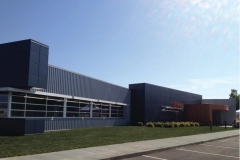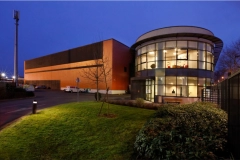4 Reasons Colocation Providers Must Put Sustainability Plans to Action
4 Reasons Colocation Providers Must Put Sustainability Plans to Action
In this edition of Voices of the Industry, Ivonne Valdes, Vice President of Global Sales for the Cloud and Service Provider (C&SP) segment at Schneider Electric, shares four reasons why sustainability is a business imperative for colocation providers.

Ivonne Valdes, Vice President of Global Sales for the Cloud and Service Provider (C&SP) segment at Schneider Electric
As we continue to move from the industrial age to the digital age, data demands have surged. The new challenge of meeting these data demands while improving sustainability metrics puts data center managers in a compromising position. Given data centers consume 1-2% of total energy, optimizing centers’ power usage effectiveness (PUE) – the total energy entering the datacenter divided by the energy used by IT equipment inside the datacenter – is the first step towards sustainable data supply and management.
Traditionally sustainable choices have centered around “using less,” when in reality it is about “using better.” The terms “efficiency” and “sustainability” are not interchangeable despite many companies using them as such. In fact, the United Nations has defined sustainability as: “meeting the needs of the present without compromising the ability of future generations to meet their own needs.” Considering this definition and the stakes of our industry, the bar must be set higher than just “use less.”
Colocation Tenant Requirements
Working with colocation providers nationwide has provided invaluable insight in how to accomplish sustainability now, and in the future. It must be a cooperative effort. To effectively address these challenges and make a lasting impact, customer needs must be understood first which often means meeting data center leaders where they are.
Recent data from 451 Research asserts that colocation tenants are asking for sustainability commitments from providers in their contracts. As companies of all sizes are occupying colocation facilities while making public net-zero emissions commitments, providers must understand that these tenants are required to report their Scope 3 emissions, which are emissions from their suppliers – including their colocation service providers. One solution to increasing the integrity of Scope 3 emissions reporting is for data center managers to require vendors to provide Type III Environmental Product Disclosures that document the embedded carbon footprint of the product.
Beyond reporting, tenants are also seeking providers who are reducing their Scope 1 and 2 greenhouse gas (GHG) emissions through Power Purchase Agreements (PPAs) for renewables and alternative fuel sources. Circular economy programs, like recycling equipment and batteries, are also attractive solutions for providers to reduce waste, and ultimately increase their sustainability. Energy and Sustainability Services (ESS) departments need to work with customers to reduce emissions and negotiate PPAs. The importance of these customer relationships cannot be overstated. For example, last year, Schneider’s ESS department worked with customers to save 134 million metric tons of CO2 on their end.
Measuring and communicating emissions is a viable solution to bolster accountability for our role in the ecosystem and will assist in the ongoing search for new sustainability solutions.
Government Regulations
The second reason colocation providers should prioritize sustainability deals with government regulations.
Government agencies have been monitoring the data center industry for years. In the government’s eyes, the primary metrics for determining sustainability include centers’ use of chemicals as coolants in HVAC equipment (ex: sulfur hexafluoride, also known as SF6), and management of construction and use of resources. It would behoove data center managers to understand the environmental impact of these elements and include mitigation measures in their sustainability plans.
SF6 is a manufactured fluorinated gas that has been traditionally used in the medium voltage (MV) switchgear in data centers. The chemical makeup of SF6 makes it highly effective for electrical current breaking and insulation. However, it is the single strongest greenhouse gas on the planet and its use causes a significant impact on global warming. In fact, it is estimated that SF6 remains in the atmosphere for 3,200 years. Governments have taken action to reduce the implementation of equipment utilizing SF6 and, in preparation, companies have been developing SF6-free alternatives.
The trend of increased government action is likely to continue as more governments issue sustainability recommendations, which will influence stronger requirements in the future.
Business Value
It’s clear colocation tenants are looking for providers who place an emphasis on sustainability. But without a clear sustainability implementation plan, it’s difficult to demonstrate business value. Having a comprehensive sustainability action plan in place is undoubtedly a competitive advantage as it aligns with most potential tenants’ business needs and marketing strategies. However, the business value of sustainability goes much further than a PR campaign.
High resiliency adds a level of comfort and the ability to reassure data center managers who lose sleep over the prospect of any amount of downtime. Modern innovations that prioritize efficiency and sustainability also improve the overall performance of the data center.
Examples of these solutions include products that are more compact and enable operators to “Live Swap” or, in other words, safely add or replace the power modules while the UPS is online and fully operational. These innovative features enhance business continuity without the risk of unexpected downtime.
ESG Investment
Lastly, colocation providers should prioritize sustainability to galvanize their environmental, social and governance (ESG) Investment.
Companies that decrease their environmental footprint and clearly communicate their ESG commitments increase their access to the growing number of investment funds (i.e. bonds) that are being made available. Most public companies are publishing sustainability reports and adopting their commitments in their governance structure. Some government agencies are also offering financing in the form of loans, grants, and other sources for projects that reduce carbon footprint or improve energy efficiency.
Sustainability is more than using less or using better – it’s critical to address our century’s greatest challenge: the climate emergency. It’s also a business imperative for data center managers who wish to outperform the competition.
Ivonne Valdes is Vice President of Global Sales for the Cloud and Service Provider (C&SP) segment at Schneider Electric. Schneider Electric drives digital transformation by integrating world-leading process and energy technologies, end-point to cloud connecting products, controls, software and services, across the entire lifecycle, enabling integrated company management, for homes, buildings, data centers, infrastructure and industries.
More >> 4 Reasons Colocation Providers Must Put Sustainability Plans to Action


